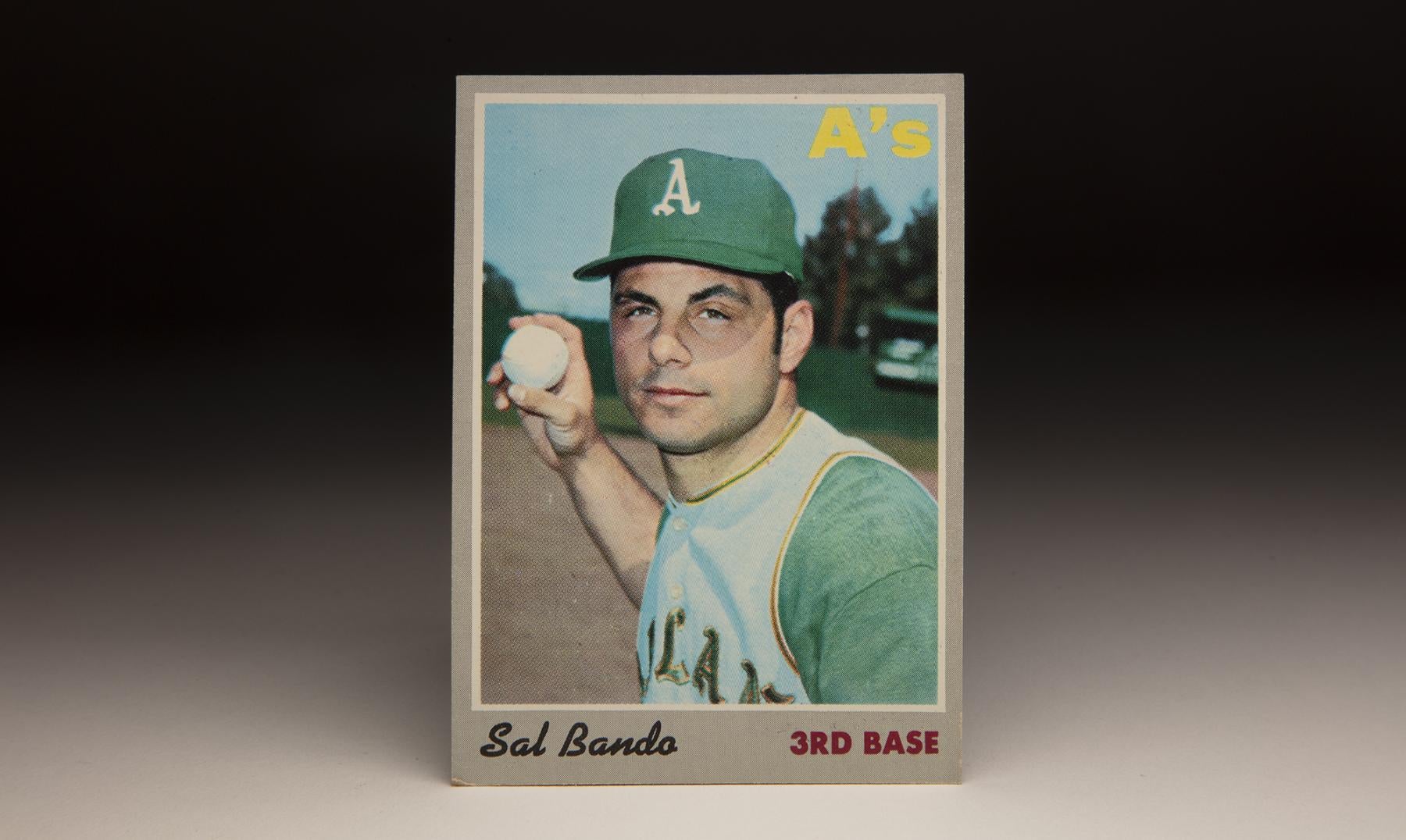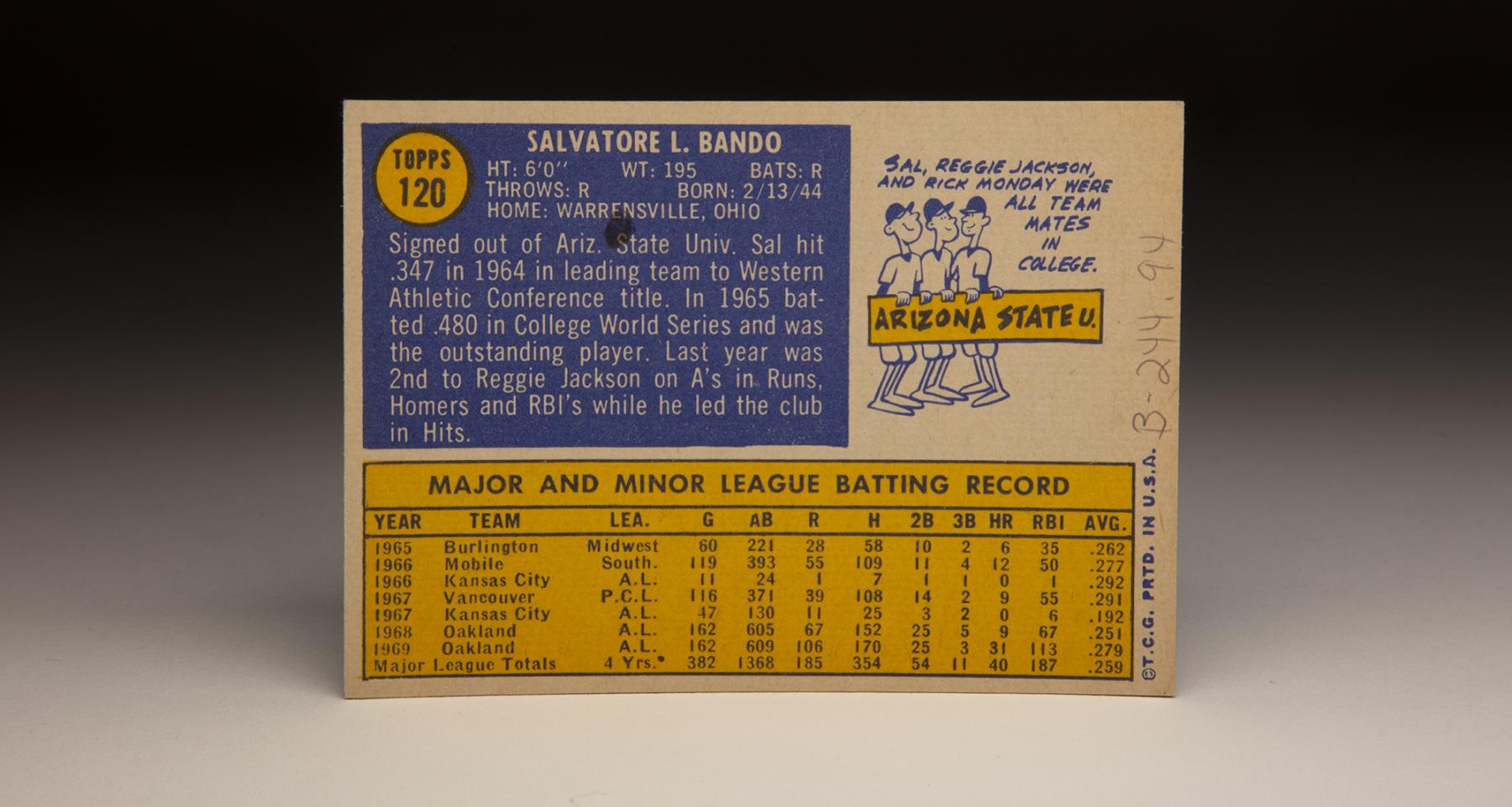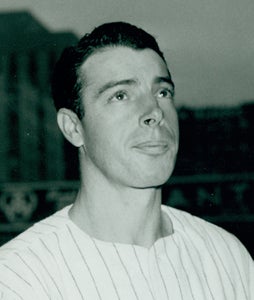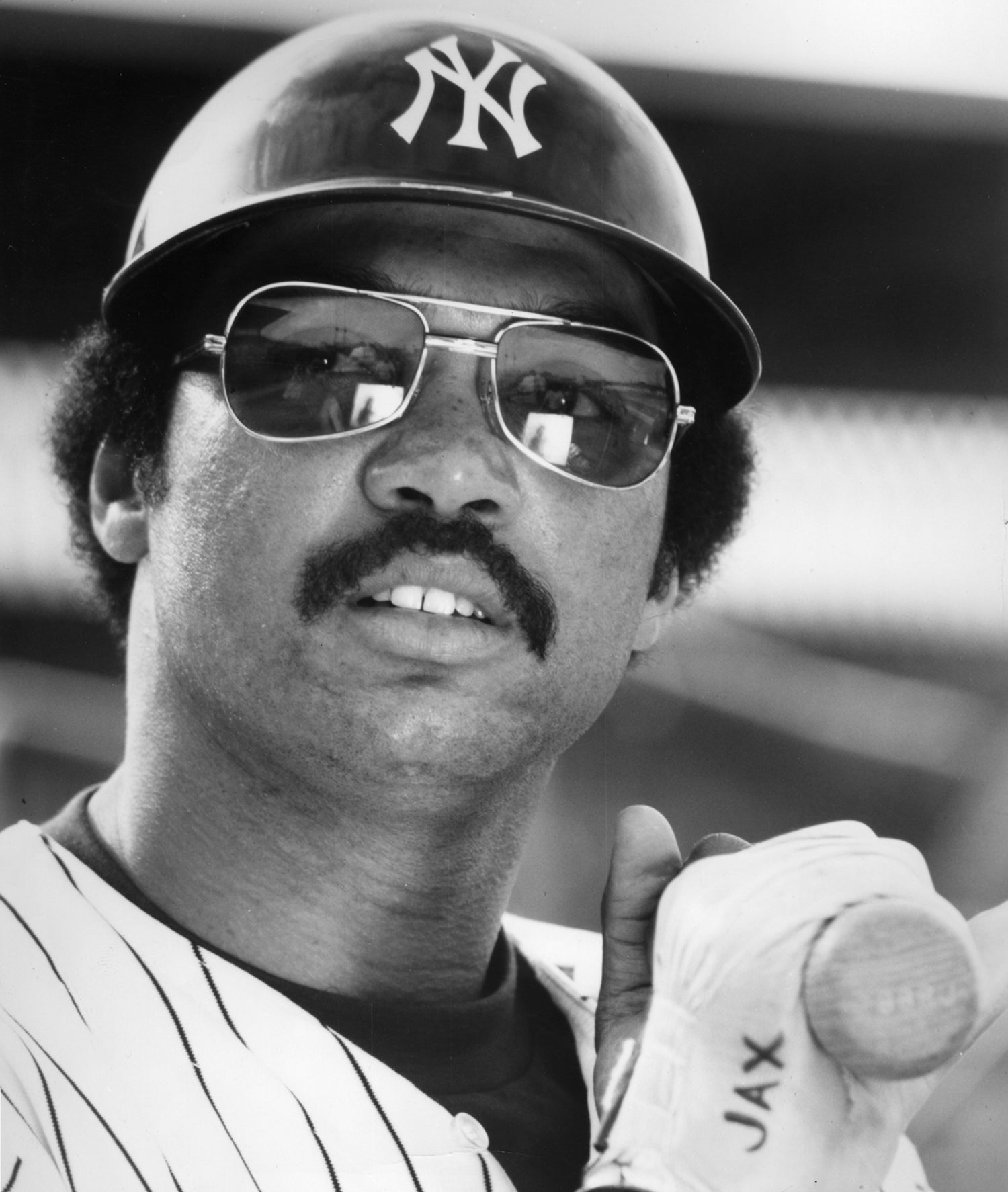- Home
- Our Stories
- #CardCorner: 1970 Topps Sal Bando
#CardCorner: 1970 Topps Sal Bando
Among players whose big league careers began in the post-1960 expansion era, nine primary third basemen have accumulated a career Wins Above Replacement of at least 60.0.
Among those, only Sal Bando won as many as three World Series titles.
The captain of the Oakland Athletics dynasty of the 1970s and the glue that held together the Swinging A’s, Bando’s 61.5 career WAR ranks 14th among all players who appeared in at least half their games at the hot corner.
On a team that seemed to go out of its way to make headlines, Bando quietly produced wins and championships like few before or since.
Born Feb. 13, 1944, in Cleveland, Bando was raised in suburban Warrensville Heights, Ohio, and starred on area baseball, football and track teams. He accepted a baseball scholarship to Arizona State University, which had introduced varsity baseball as a sport only three years before Bando graduated from high school. In his sophomore season of 1964, Bando led all Western Athletic Conference/Southern Division hitters with a .458 batting average – and the Sun Devils advanced to the first College World Series.
The next season, with Bando a vital part of a team that also featured future big leaguers Rick Monday and Duffy Dyer, Arizona State won the national title with a record of 54-8, setting a new standard for most victories in one season. Bando was voted the Most Valuable Player of the College World Series after hitting .480 and establishing records with 12 hits and 21 total bases. He scored the winning run in the 2-1 series-clinching victory over Ohio State.
The Athletics, then located in Kansas City, made Bando their sixth-round choice in the inaugural MLB Draft that summer. Monday was selected No. 1 overall by Kansas City.
“I’m not one to stand in the way of a top prospect who can get good money,” Sun Devils coach Bobby Winkles told the Tucson Citizen following the championship game. “But I sure hope I can keep some of them.”
But that same edition of the Citizen featured a photo of Athletics owner Charlie Finley beaming between Bando and Monday in their ASU uniforms.
Bando quickly signed with the A’s for a reported $35,000 bonus.
He was assigned to Class A Burlington that summer, where he hit .262 with six homers and 35 RBI in 60 games.
“It took Bando a while to make the change from college baseball to professional,” Burlington manager Gus Niarhos told the Kansas City Star. “He started real slow…but he’s shown he can hit for distance.
“We won’t have to worry about Bando – he’ll make it.”
The A’s brought Bando to Spring Training with the big league club in 1966 but sent him to the minors in mid-March as the team kept an eye on the future. Bando hit .277 with 12 homers and 50 RBI for Double-A Mobile that summer, then debuted with Kansas City on Sept. 3, 1966. He totaled seven hits in 11 games, then spent most of the 1967 campaign with Triple-A Vancouver, where he hit .291 with a .392 on-base percentage in between stints with Kansas City in May/June and September.
When Bando was sent back to Vancouver for more seasoning on June 7, the Athletics called up Reggie Jackson – for his first taste of the big leagues – to take his place.
“We’ve just got to score more runs,” Kansas City manager Alvin Dark told the Associated Press, referencing Bando’s .143 batting average and .175 slugging percentage.
But Bando returned to the Athletics in September and hit .239 over the final month of the campaign. The A’s moved to Oakland following the season – and Bando, who hit 10 home runs in Spring Training in 1968 – Bando moved in as the team’s starting third baseman.
“This boy Bando looks like he has a great future ahead of him,” Joe DiMaggio told the Sacramento Bee in the spring of 1968 when he was serving as an Athletics’ coach and executive. “He makes good contact with the ball and hits it a long way. (He) can field and has a strong arm.”
Bando played in each of the team’s 162 games that season, hitting .251 with nine homers, 67 RBI and 13 stolen bases. Then in 1969, the A’s showed glimpses of their championship future when Bando hit .281 with 31 homers, 113 RBI and 111 walks while Jackson blasted 47 long balls to go with 118 RBI and 123 runs scored.
Bando was named to his first All-Star Game – earning the starting assignment at third base – and finished 16th in the American League Most Valuable Player Award voting, the first of six straight seasons where he would draw MVP votes. He was named the Athletics’ captain that season at the age of 25.
“I’ll be the first to admit I’m not a superstar,” Bando told Copley News Service. “But I do want to play very well.”
The Athletics improved to 89-73 in 1970, and Bando hit .263 with 20 homers, 75 RBI and a .407 on-base percentage. Then in 1971, new manager Dick Williams – the A’s fifth different Opening Day skipper in five seasons – led Oakland to 101 wins and the AL West title. Bando, who quickly became one of Williams’ favorite players, hit 24 home runs and drove in 94 runs, finishing second in the AL MVP vote – earning four first-place votes and finishing behind only teammate Vida Blue.
The A’s were swept by the Orioles in the ALCS – Bando hit .364 – but the pieces were now in place for one of the game’s great dynasties.
In 1972, Oakland ended the three-year reign of the Orioles as AL pennant winners. Oakland went 93-62 to finish five-and-a-half games in front of the White Sox in the AL West, then defeated Detroit in a tense five-game ALCS – with Bando’s sacrifice bunt in Game 5 moving George Hendrick into scoring position and leading to Gene Tenace’s RBI single that put the A’s in the lead for good in their 2-1 victory.
The World Series featured six one-run games, and the A’s defeated the Reds 3-2 in Game 7 – and Bando drove home what proved to be the game’s winning run with a sixth-inning double off Pedro Borbón.
“I don’t think we could have expected to beat a team like Cincinnati in less than seven games,” Bando told United Press International.
Bando hit just .236 with 15 homers and 77 RBI in 1972 – the last season without the designated hitter for the American League – but still earned an All-Star Game berth and support in the AL MVP voting.
In 1973, Bando bounced back with league-leading totals in doubles (32) and total bases (295) while hitting .287 with 29 homers and 98 RBI. Once again, the A’s needed the maximum amount of games in the ALCS and World Series to take the title, with Bando powering Oakland to a win in Game 2 of the ALCS vs. Baltimore with two homers and three RBI.
Bando was denied a third home run in that game when Orioles left fielder Al Bumbry robbed Bando at the wall in the third inning.
“I couldn’t sleep at all (the night before),” Bando told the Evening Sun in Baltimore prior after Game 2, which the A’s entered trailing the ALCS one-game-to-none. “I was too nervous.”
Bando, however, needn’t have worried: His A’s always seemed to play their best when the game’s mattered most.
Williams resigned as Oakland’s manager following the World Series, and Dark returned to lead the club in 1974. Bando hit .243 with 22 home runs and 103 RBI while adjusting to Dark’s style, at time openly disagreeing with his new manager. But conflict was part of the Athletics’ culture – and Oakland rolled past Baltimore and Los Angeles in the postseason, this time needing just nine games instead of the maximum of 12.
Bando, however, was dissatisfied with the actions of Finley, who seemed to thrive on change and disruptions. Bando and Finley battled over salary nearly every winter in the mid 1970s.
“It began to ruin every winter for me,” Bando told the Los Angeles Herald-Examiner prior to the 1975 season, when an arbitrator ruled for Finley’s $100,000 salary offer – the same salary Bando drew in 1974 – instead of Bando’s request for $125,000. “I’d wake up in the middle of the night and be arguing in my mind with Finley.”
Bando’s streak of three straight All-Star Game selections was snapped in 1975 when he hit .230 with 15 homers and 78 RBI. The A’s won their fourth straight AL West title, but the dynasty ended when the Red Sox swept Oakland in the ALCS despite Bando’s 6-for-12 effort at the plate.
Then in 1976, Bando and several other A’s players refused to sign their contracts in hopes of playing out the season and becoming free agents, following in the path of Andy Messersmith and Dave McNally the year before. A new collective bargaining agreement hammered out that summer made those moves unnecessary, but Finley reacted by cutting Bando’s salary by 20 percent – the maximum allowed under the CBA.
After hitting .240 with 27 home runs, 84 RBI and a career-high 20 stolen bases in 1976, Bando became a free agent. He quickly signed a five-year deal with the Brewers worth a reported $1.5 million, including deferrals that would keep him financially secure for decades.
But Bando’s choice to join the Brewers was based on much more than dollars.
“I knew that the rest of my major league career would be with the club I selected,” Bando told the Chicago Tribune. “And that this period would cover the ‘meat’ of my son’s (Bando’s children at the time were six-year-old Sal Jr. and three-year-old Sonny) early schooling. So money was not the most important thing. People were.”
Bando was named the Brewers’ captain and totaled 17 home runs and 82 RBI in his first season in Milwaukee. The next season, the Brewers posted 93 wins for their first winning campaign in franchise history with Bando hitting .285 with 17 homers and 78 RBI.
“I never thought about being the captain here,” Bando told the Chicago Tribune in early 1977. “I told them I was hesitant because I was a new man here. They told me: ‘Don’t worry about it. They’re already calling you captain.’”
Bando began slowing down in 1979, appearing in just 130 games after averaging 156 games a year from 1968-78. He hit just .197 over 78 games in 1980 and appeared in just 32 games in 1981 – though he started at third base in all five games of the ALDS vs. the Yankees in the Brewers’ first-ever appearance in the postseason. Bando hit .294 with three doubles as New York won in five games.
That same season, Bando’s younger brother Chris debuted for the Indians to begin a nine-year big league career.
Sal retired following the 1981 season, moving into a role with the Brewers’ front office and trying his hand at color commentary with NBC-TV’s baseball crew.
“I’m not going to be on those extended road trips anymore,” Bando told UPI in the spring of 1982, enjoying his new role with his wife Sandy and a house that now featured three sons. “I feel really good about that, about being a fulltime husband and dad at last.”
But Bando remained active with the Brewers, working his way up through the organization until he was named the team’s general manager in 1991. He remained in that role for almost eight years.
Bando’s final career totals: a .254 batting average, 1,790 hits, 242 home runs, 1,039 RBI, 1,031 walks, a .352 on-base percentage and three World Series rings.
The heart of the only non-Yankees team ever to win three straight World Series titles, Captain Sal left a legacy of victory.
“I define ‘leadership’ as ‘hustle,’” Bando told the Chicago Tribune. “If you’re the guy who’s supposed to be the leader and you hustle 100 percent, it’s catching. If you don’t hustle, it’s catching too.”
Craig Muder is the director of communications for the National Baseball Hall of Fame and Museum
Related Stories
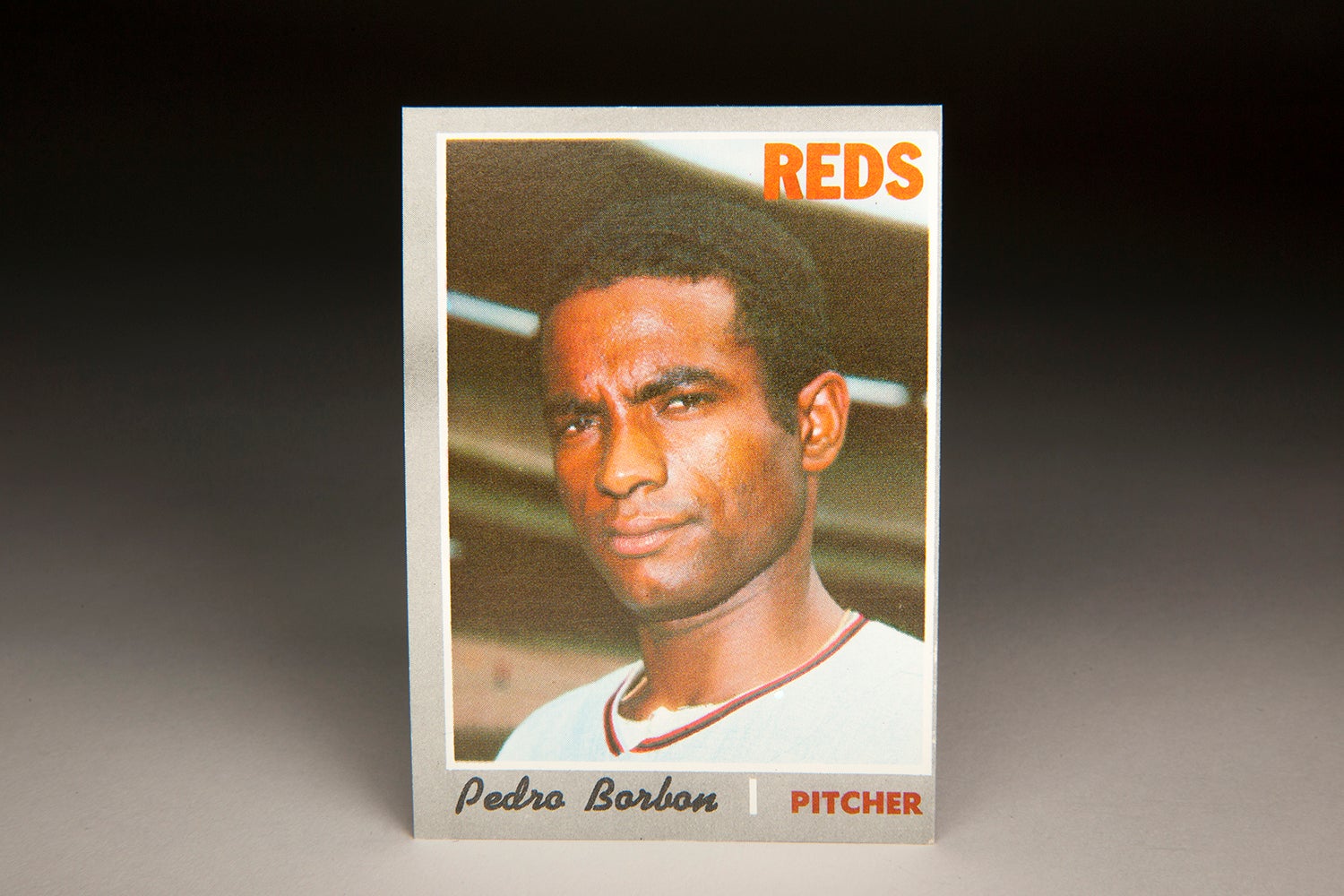
#CardCorner: 1970 Topps Pedro Borbón
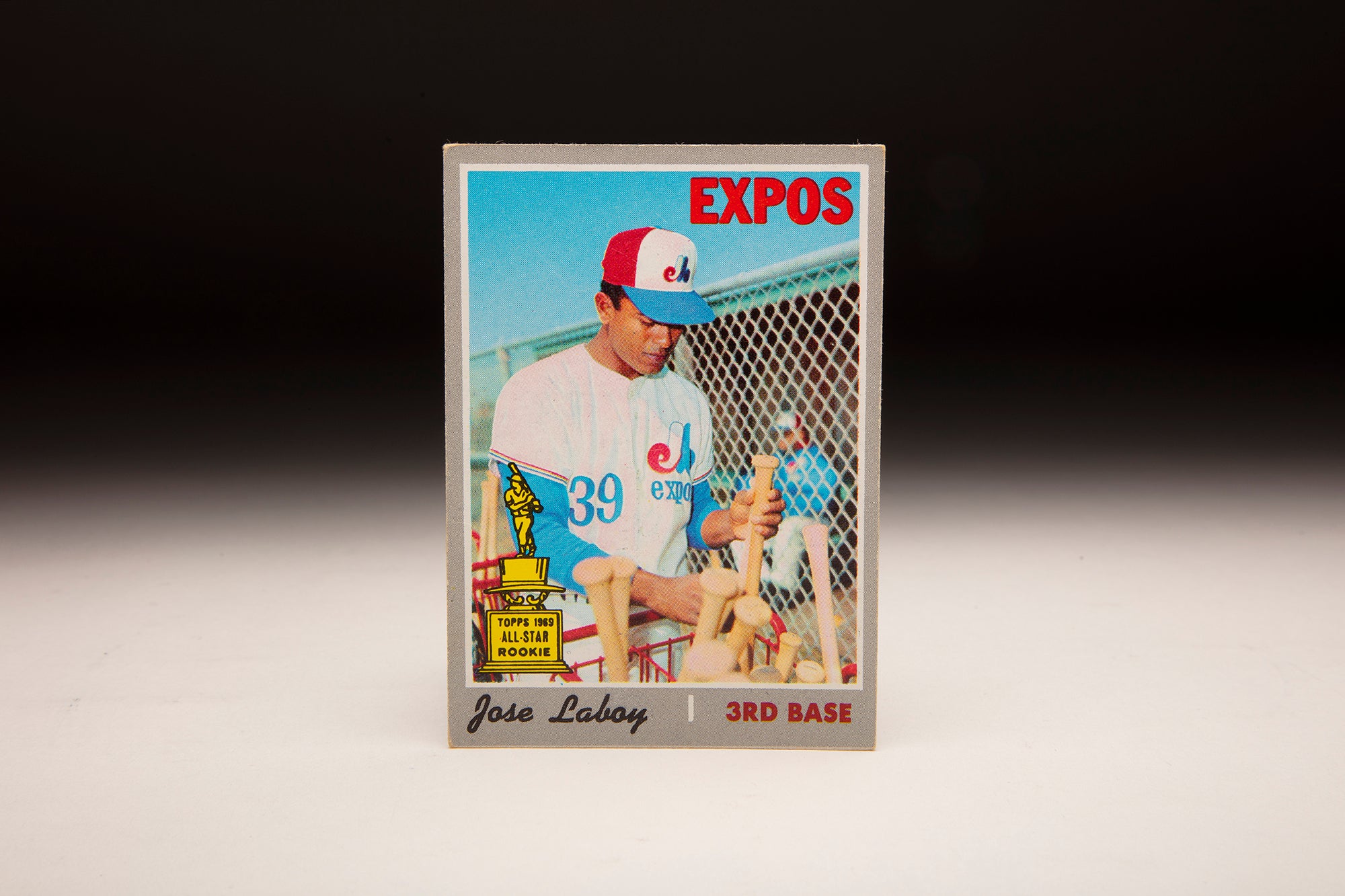
#CardCorner: 1970 Topps Jose ‘Coco’ Laboy
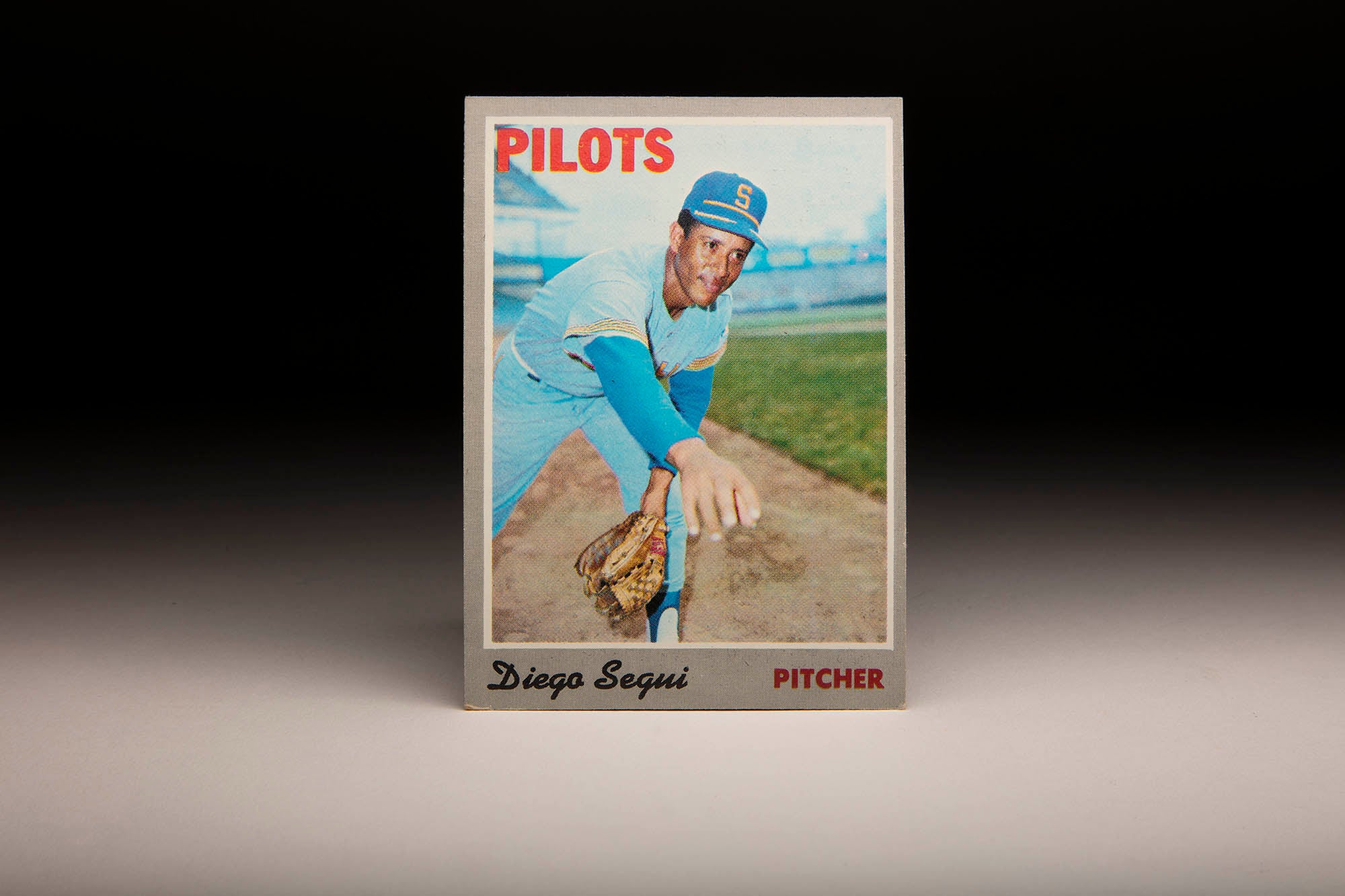
#CardCorner: 1970 Topps Diego Seguí
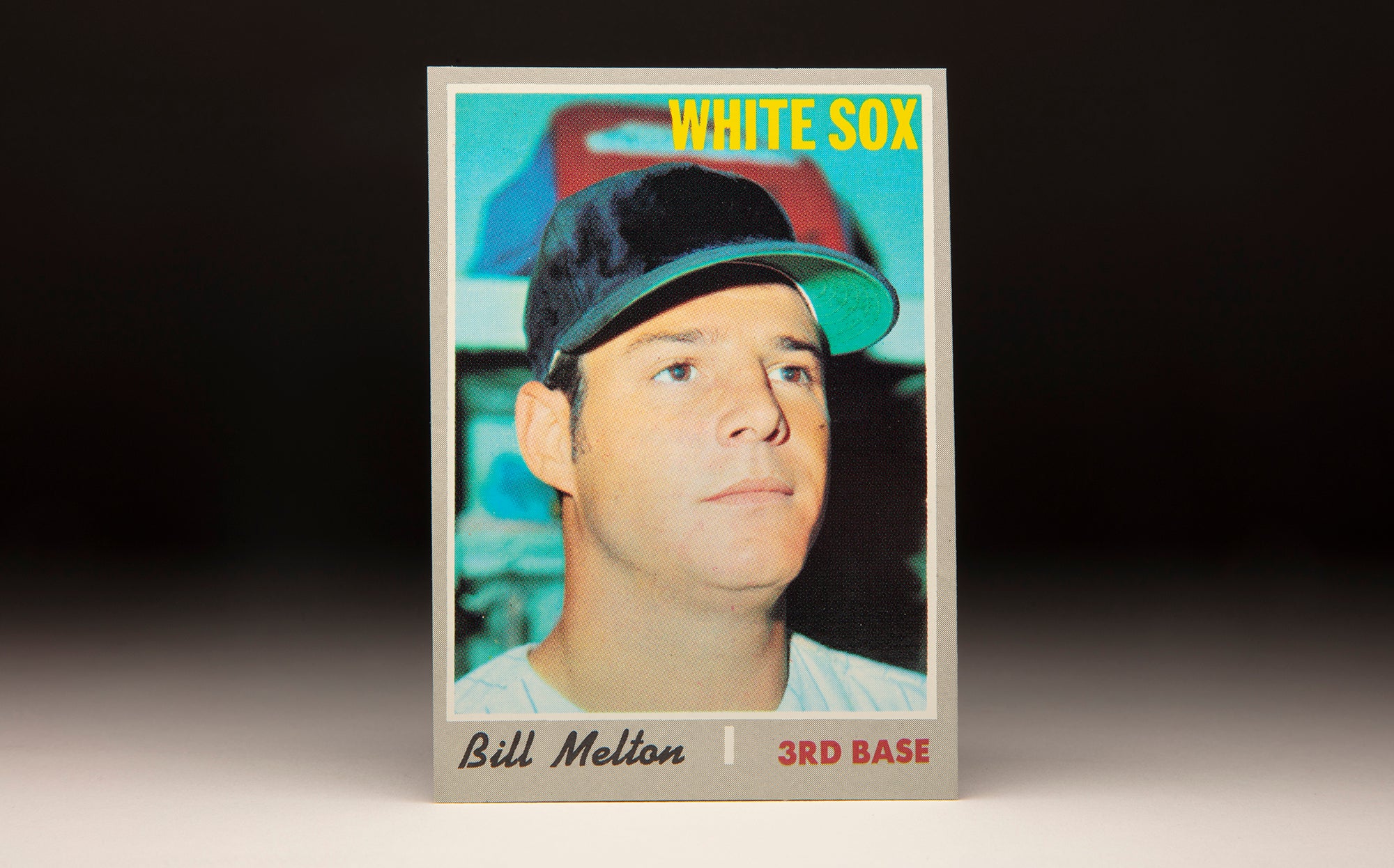
#CardCorner: 1970 Topps Bill Melton
Related Stories

#CardCorner: 1970 Topps Pedro Borbón

#CardCorner: 1970 Topps Jose ‘Coco’ Laboy

#CardCorner: 1970 Topps Diego Seguí


